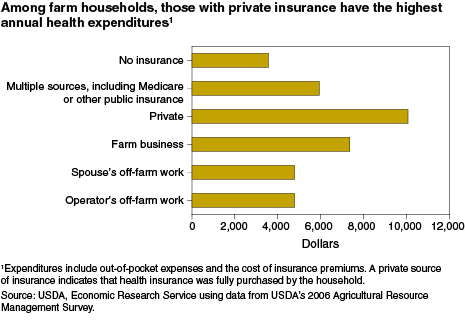Health Care Expenditures of Self-Employed Farm Households
- by Hisham S. El-Osta and Mary Ahearn
- 9/20/2012
An underpinning of the health care system in the United States is employer-sponsored health insurance, which is offered to employees as part of a compensation package. Such a system can present challenges to self-employed individuals, such as farmers and ranchers, and their families. Moreover, farming is among the most hazardous occupations, and farmworkers and their households face a higher risk of injury and illness than individuals in many other work environments.
Although most farmers are self-employed, the share of farm operator household members that have no form of health insurance is about the same as that of the overall U.S. population (13 and 16 percent, respectively). A farm business does not generally offer employment-based health insurance, but other factors help to equalize insurance coverage. In the majority of farm operator households, the operator or spouse is also employed off the farm, so the most common source of health insurance for members of farm households is employment based. In addition, having health insurance is closely associated with a person's age and income. Coverage increases with both, and farm operator households are more than three times as likely as other household types to be headed by an individual over age 65. Farm operator households also have higher incomes and net worth, on average, than the general U.S. population, but much of their net worth is tied up in their farming business and farm income can vary widely from year to year. Given that farm operator households have relatively high net worth and tend to rely on family labor to operate the farm business, adequate health insurance coverage for household members may be as important to the financial security of the farm business as it is to the health of the family.
Because so many factors affect health expenditures, ERS researchers used statistical techniques to measure the impacts of source of health insurance on health care expenditures of nonelderly, married farm operators and their households, while controlling for farm operator household characteristics. Health expenditures include both out-of-pocket costs and the family's insurance premium. Age and income, not surprisingly, were found to have a significant effect on health care expenditures. Findings also suggest that farm households purchasing individual health insurance directly from private vendors are likely to spend more on health care than those with other sources of health insurance. Other things being equal, households without any insurance coverage had the lowest health care expenditures.
This article is drawn from:
- 'Health Care Expenditures of Self-Employed Farm Households in the United States'. (2012). Agricultural Economics. 'Health Care Expenditures of Self-Employed Farm Households in the United States,' by Ashok K. Mishra, Hisham S. El-Osta, and Mary C. Ahearn, in Agricultural Economics, Vol. 43, No. 1, January 2012, pp. 75-88..


